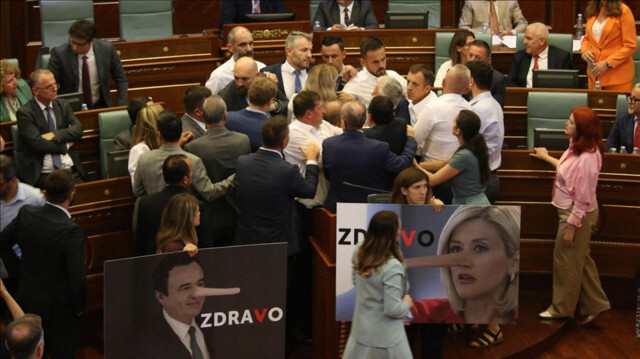
Fighting breaks out after opposition lawmaker splashes water in prime minister's face during his address to assembly
Kosovo’s parliament erupted in a brawl Thursday over an agreement with the European Union to de-escalate tensions in the country’s northern region.
Fighting broke out between lawmakers in the national assembly after Mergim Lushtaku, an opposition lawmaker from the Democratic Party of Kosovo, approached Prime Minister Albin Kurti while he was speaking and threw water from a plastic bottle at him, splashing him in the face.
Ruling members of parliament immediately reacted and rushed to protect Kurti.
A fistfight then broke out between lawmakers from both sides.
The attack came as Kurti spoke about the agreement with the EU to de-escalate tensions in Kosovo’s northern municipalities.
Kosovo’s parliament speaker Glauk Konjufca, who was also reportedly hit with a water bottle, delayed the session for a few hours.
The European Union expressed disappointment over the incident.
''Disappointing scenes of violence seen today in the Assembly. The Assembly is not a place for physical attacks, but a place to discuss proposals and policies in a democratic manner. Discourse and exchange of ideas are basic foundations of a democracy,'' said EU Ambassador Tomas Szunyog.
Kosovo President Vjosa Osmani and Albanian Prime Minister Edi Rama condemned the brawl.
''Violence has no place in the temple of democracy and cannot become a political tool,'' said Osmani on social media.
Rama said the incident in parliament harmed Kosovo internationally.
“Imagine how the irreplaceable allies and friends of Kosovo and the Albanians feel when they see how Albanians grabbed each other by the throat instead of fighting with ideas and words, not insults and fists,'' he said.
Tensions continued to rise between the ruling party, which wanted to continue the session under all circumstances, and the opposition, which demanded that the session end.
Kosovo on Wednesday revealed details of an agreement it reached with the EU on steps to de-escalate tensions in the country’s north.
The transactions on the agreed issues will be completed within two weeks.
Following April elections in northern Kosovo, the EU said the low turnout among Serbs did not provide municipalities with long-term political solutions.
Ethnic Serbs in the region have been protesting the election of Albanian mayors since late May.
On May 30, after 30 soldiers were injured during unrest in the region, NATO sent 700 more troops to the Kosovo Force (KFOR), the alliance-led peacekeeping mission in Kosovo. The reinforcements included a contingent of Turkish forces.
Kosovo and Serbia need to resolve disputes and reach an agreement to move forward with their integration into the EU.
When the government in Pristina declared its independence from Serbia 15 years ago, most UN member states including the US, UK, France, Germany and Türkiye recognized it as a separate country, but Belgrade continues to regard it as its territory.

